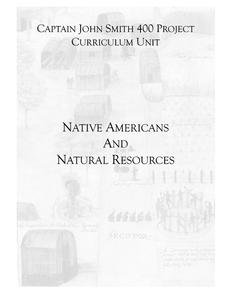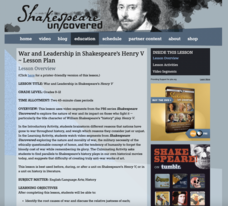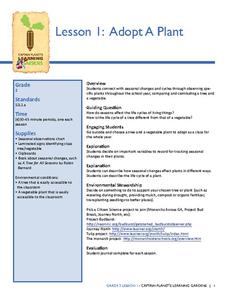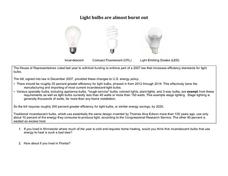Curated OER
Sounds Like Great Science!
A phenomenal lesson on sound is here for your third graders! In it, learners engage in hands-on activities, watch video, take part in Internet activities, and complete tasks in cooperative groups in order to explore the world of sound...
Captain Planet Foundation
Sorting Out Soils
Sift through soil and learn about why it's important for organic processes. After discussing what makes up soil, such as the living organisms and what types of soil have more nutrients, kids sample layers of mulch and deeper soil to...
Curated OER
Suited for Space
A fantastic lesson on survival in outer space should excite your learners! Pupils explore the challenges that living, working, and surviving in space elicit. They focus on the spacesuit itself; how it protects astronauts, and enables...
Shakespeare Uncovered
Henry IV, Part I: Does Father Know Best?
“Yea, there thou mak’st me sad and mak’st me sin/In envy that my Lord Northumberland/Should be the father to so blest a son--.” Henry IV, Part I, provides the text for a series of exercises that ask class members to examine the...
Curated OER
Native Americans and Natural Resources
North American Indian civilizations had already been in place for over 10,000 years before the arrival of European settlers. Introduce your young historians to Indian tribes that lived in the Chesapeake region in the early seventeenth...
The New York Times
Fiction or Nonfiction? Considering the Common Core's Emphasis on Informational Text
Nothing aids in comprehension more than an explanation and understanding of why things are done. Address why the Common Core requires the reading percentages that it established and analyze how this affects your readers. Learners read...
Curated OER
History of the Star Spangled Banner
We have all heard the "Star Spangled Banner" at many points in our lives, but how often do we take the time to truly understand what the words of the national anthem mean to Americans? Don't miss this opportunity to examine the lyrics...
Smithsonian Institution
Mobilizing Children
Scholars find out how the government used propaganda to mobilize children to help in the war effort. Lesson exercises include analyzing a quote from Franklin Roosevelt, viewing propaganda images and posters, and participating in a lively...
Curated OER
Neighborhood or Slum? Snapshots of Five Points: 1827-1867
How has your local neighborhood changed throughout recent history? Young researchers evaluate census data, images, and primary source descriptions describing the living situation in the antebellum Five Points neighborhood. They consider...
Shakespeare Uncovered
War and Leadership in Shakespeare’s Henry V
“Compared to war all other forms of human endeavor shrink to insignificance.” “War is not healthy for children and other living things.” These two views of war, embodied in George Patton’s statement and Lorraine Schneider‘s famous 1966...
Federal Reserve Bank
The Free Silver Movement and Inflation
Why are US dollars no longer backed by gold and silver? What is our medium of exchange, and what would it be like to live in a barter economy? Learners consider these questions, as well as learn about the major historical events in the...
Captain Planet Foundation
Adopt-A-Plant
Note the way that plants change during the season by adopting a plant on your school campus. After your class chooses their plant, they research the plant's needs, how it differs from other plants, find ways to support their plant's...
Curated OER
Diversity in Media: Looking Critically at What We See
This learning experience fosters awareness of representations we see, and don't see, in the media. Learners list TV programs, games, and films they enjoy, identify characters' ethnic, religious, (dis)ability, and sexual orientation...
Curated OER
Disguise for the Eyes
Young scientists discover how many, many animals use color as a way of helping them to survive in the wild. They understand how animals use color in their everyday lives. Pupils engage in hands-on activities, watch videos, access...
Channel Islands Film
Once Upon a Time (Sa Hi Pa Ca): Lesson Plan 3
What was the most significant tool used by the Chumash? How did the environment make the tool possible? What group behaviors allowed the Chumash be be successful for thousands of years? After watching West of the West's documentary Once...
University of California
Impact of the California Missions on Native Americans
While the Spanish claimed to bring civilization to California indigenous peoples, in reality, they also brought violence and forced assimilation to European values. Primary sources, such as the reports of Catholic priests and Europeans...
Curated OER
Light Bulbs are Almost Burned Out
Incandescent light bulbs were enlightening more than 130 years when Thomas Edison invented them. More recently, US Congress passed legislation to increase efficiency standards. Your 5th, 6th, or 7th graders will be enlightened as they...
Reed Novel Studies
The Westing Game: Novel Study
A legacy lives on. Even though Samuel Will Westing, a character in the The Westing Game, has passed away, his love for games lives on through the unusual selection in his will. Scholars read of the mystery, learn 10 new vocabulary words,...
NASA
Is It Alive?
Determining whether or not something is living can be more difficult than it seems. Put your young scientists to work defining their own criteria to identify life, then work with three samples to see if they are alive or not.
Federal Reserve Bank
Lesson 4: Back to School
Based on your current level of human capital, how long would it take you to earn $1,000,000? What about your potential human capital? Learners explore the importance of education and experience when entering the workforce, and compare...
Alliance Theater
The Jungle Book Post-Show STEAM Lesson
An ecosystem is really just the flow of energy through many different living organisms. A study of Rudyard Kipling's The Jungle Book leads to an environmental science activity in which learners study how various factors can affect...
Curated OER
DNA: Expressions in Agriculture
What is DNA extraction, and can you make a living doing it? Yes, if you are in a biotechnology field. Kids learn about DNA extraction, GMOs, and biotechnology careers. They then watch videos and complete activities to understand the use...
Earth Day Network
The Neolithic Revolution
With the abundance of food products we can easily access in our society today, it is easy to forget the toll this can take on our global environment. Young learners will discover how the transition to agriculture and domesticated living...
Speak Truth to Power
Elie Wiesel: Speaking Truth to Genocide to Power
Invite your learners to discover the efforts of Night author Elie Wiesel to promote awareness of genocide in the world. After watching and reading an interview of Elie Wiesel, high schoolers work to create a living Holocaust museum by...
Other popular searches
- Poor Standard of Living
- Standard of Living Norway
- Europe Standard of Living
- Standard of Living in Europe

























